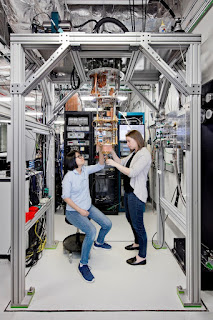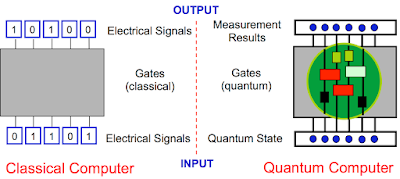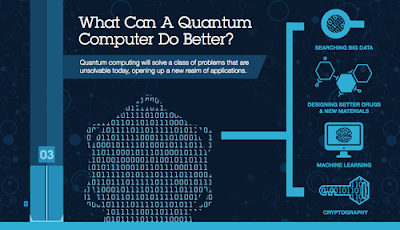Twitter Feed
Cloud Computing as a Strategic Asset
For some reason, this week seems to have more in it than most. While the steady stream of briefing request seem to be increasing, the post briefing discussions also seem…
Vivek Kundra: “Engage the American People in their Daily Digital Lives”
Today I attended a very impressive talk by the Federal CIO, Mr. Vivek Kundra at a Northern Virginia Technology Council Public Policy event. His open and “matter of fact” approach…
McKinsey vs. Booz Allen Hamilton !
A community skirmish reminiscent of the recent “manifestogate” has apparently erupted around the McKinsey & Co. report “Clearing the air on cloud computing“. Booz Allen Hamilton Principals Mike Cameron and…
Oracle Buys Sun!!
Swooping in from nowhere, Oracle buys Sun for $7.4B!! “This morning, the companies announced that they’d struck a deal worth $7.4 billion or $5.6 billion net of Sun’s cash and…
Aneesh Chopra Nominated For Federal CTO
Although Aneesh Chopra is a new name for most, he is well know in Virginia as Governor Tim Kaine’s Secretary of Technology. For the Commonwealth, he was charged with leading…
Could Cloud Computing Cost More?
In a recent conference, analyst William Forrest says that large companies could end up paying more than twice as much by using cloud based services. According to a Forbes.com report,…
Cisco’s Cloud Computing Strategy
A couple of weeks ago, Krishna Sankar provided a glimpse into Cisco’s cloud computing strategy in a presentation titled “A Hitchhiker’s Guide to the Inter-Cloud” . The presentation outlined the…
NCOIC and Cloud Computing: An Update
As the NCOIC gets it’s arms around this new paradigm, the Cloud Computing Working Group has focused on establishing a roadmap for providing value to the industry. Using the established…
SUN-IBM Talks Breakdown
As reported in multiple sources today, including Reuters, Sun has apparently rejected a purchase offer by IBM. “Shares of Sun Microsystems Inc tumbled 22.5 percent after it rejected a $7…
Former DoT CIO on Cloud Computing
Last month, former Transportation Department CIO Dan Mintz offered his views on cloud computing to Eric Chabrow, Managing Editor of Government Information Security. According to Mr. Mintz, there is currently…
- The release of a new API (Application Program Interface) for the IBM Quantum Experience that enables developers and programmers to begin building interfaces between its existing five quantum bit (qubit) cloud-based quantum computer and classical computers, without needing a deep background in quantum physics.
- The release of an upgraded simulator on the IBM Quantum Experience that can model circuits with up to 20 qubits. In the first half of 2017, IBM plans to release a full SDK (Software Development Kit) on the IBM Quantum Experience for users to build simple quantum applications and software programs.
The IBM Quantum Experience enables anyone to connect to IBM’s quantum processor via the IBM Cloud, to run algorithms and experiments, work with the individual quantum bits, and explore tutorials and simulations around what might be possible with quantum computing. Since its launch less than a year ago, about 40,000 users have run over 275,000 experiments on the IBM Quantum Experience. It has become an enablement tool for scientists in over 100 countries and, to date, 15 third-party research papers have been posted to arXiv with five published in leading journals based on experiments run on the Quantum Experience.
 The broad availability of quantum computing capability could prove to be a significant blow to current data encryption practices. In 2015 the US National Security Agency actually advised US agencies and businesses to prepare for a time when the cryptography protecting virtually all e-mail, medical and financial records, and online transactions would be rendered obsolete by quantum computing. The US National Institute for Standards and Technology (NIST) is also running a competition to spur work on post-quantum algorithms.
The broad availability of quantum computing capability could prove to be a significant blow to current data encryption practices. In 2015 the US National Security Agency actually advised US agencies and businesses to prepare for a time when the cryptography protecting virtually all e-mail, medical and financial records, and online transactions would be rendered obsolete by quantum computing. The US National Institute for Standards and Technology (NIST) is also running a competition to spur work on post-quantum algorithms. - Drug and Materials Discovery: Untangling the complexity of molecular and chemical interactions leading to the discovery of new medicines and materials;
- Supply Chain & Logistics: Finding the optimal path across global systems of systems for ultra-efficient logistics and supply chains, such as optimizing fleet operations for deliveries during the holiday season;
- Financial Services: Finding new ways to model financial data and isolating key global risk factors to make better investments;
- Artificial Intelligence: Making facets of artificial intelligence such as machine learning much more powerful when data sets can be too big such as searching images or video; or
- Cloud Security: Making cloud computing more secure by using the laws of quantum physics to enhance private data safety.
This content is being syndicated through multiple channels. The opinions expressed are solely those of the author and do not represent the views of GovCloud Network, GovCloud Network Partners or any other corporation or organization.
( Thank you. If you enjoyed this article, get free updates by email or RSS – © Copyright Kevin L. Jackson 2017)
Cloud Computing
- CPUcoin Expands CPU/GPU Power Sharing with Cudo Ventures Enterprise Network Partnership
- CPUcoin Expands CPU/GPU Power Sharing with Cudo Ventures Enterprise Network Partnership
- Route1 Announces Q2 2019 Financial Results
- CPUcoin Expands CPU/GPU Power Sharing with Cudo Ventures Enterprise Network Partnership
- ChannelAdvisor to Present at the D.A. Davidson 18th Annual Technology Conference
Cybersecurity
- Route1 Announces Q2 2019 Financial Results
- FIRST US BANCSHARES, INC. DECLARES CASH DIVIDEND
- Business Continuity Management Planning Solution Market is Expected to Grow ~ US$ 1.6 Bn by the end of 2029 - PMR
- Atos delivers Quantum-Learning-as-a-Service to Xofia to enable artificial intelligence solutions
- New Ares IoT Botnet discovered on Android OS based Set-Top Boxes




